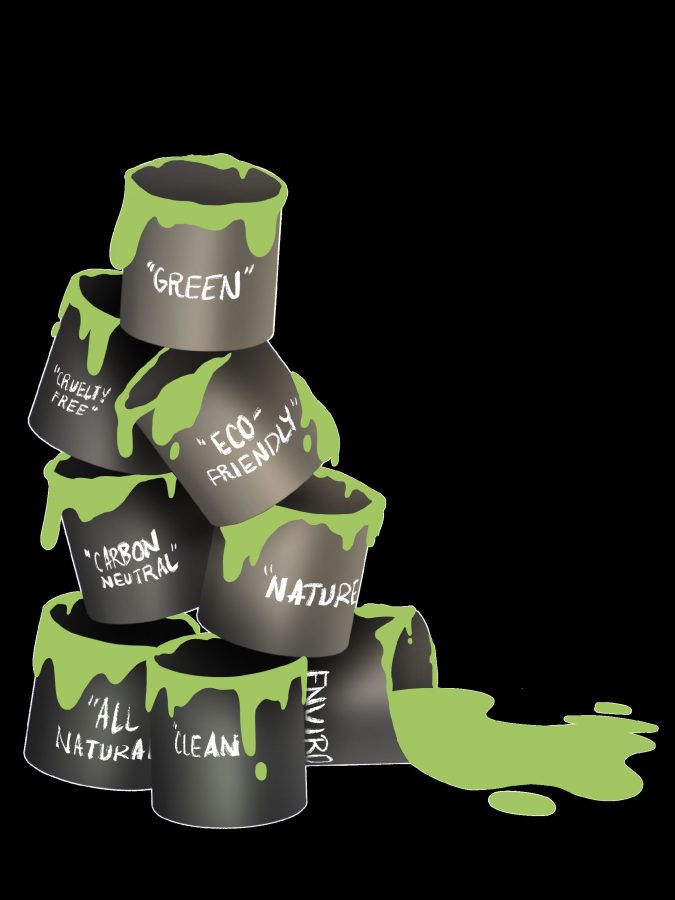Painting false shades of reality with greenwashing
Graphic Illustration by Valerie Shu
While some brands make genuine efforts to meet their claims, companies that greenwash undermine public trust in brands and green initiatives, preventing actual environmental steps from being taken.
March 10, 2023
As consumers have become increasingly aware of their environmental impact, companies have begun marketing themselves as eco-friendly. However, many do not truly follow through with fulfilling their “green” promises. Known as greenwashing, this practice of concealing a company’s harmful operations with misleading claims about their eco-friendly products can result in mass confusion, complacency and devastating environmental impacts.
“Sustainability initiatives or similar efforts might add costs or require changing corporate strategy, so we often see greenwashing with companies wanting to see benefits from the consumer side of being able to talk about a green attribute without actually having to do the work behind it,” said Natalie Kaner, Sustainability Advisor at Pure Strategies.
Greenwashing and an individual ’s sense of responsibility as a consumer can be traced back to the 1990s, when public awareness increased surrounding companies’ contributions to climate change. The term “carbon footprint” was popularized by oil and gas company British Petroleum in the early 2000s as part of a movement attempting to shift public attention away from corporate accountability, focusing instead on the impact made by the individual consumer in their daily life. On the contrary, research has shown that only 100 companies are responsible for over 70% of greenhouse gas emissions since 1988.
In response to this shift in consumer awareness, companies have worked to not only conceal harmful practices, but also attract customers with positive environmental claims. In 1992, the U.S. Federal Trade Commission issued the Green Guides, regulations designed to restrict the extent of deception allowed in marketing and branding. Regardless, companies continued to employ greenwashing in increasingly unconventional or subtle ways.
In some cases, greenwashing can be as simple as using green-colored labels, nature imagery or vague wording. Phrases with generally positive connotations but no official regulations, like “green” and “natural,” are left up for interpretation to advertisers and consumers, allowing companies to withhold specific details or exaggerate certain characteristics. Another example of greenwashing can be marketing products under positive, official sounding certifications with very little actual credibility or weight. Entire industries can be based on these misleading tactics.
“The whole recycling of plastic is essentially a version of greenwashing,” Biology teacher Isaac Pallone said. “Most plastic products aren’t recycled, they just go to the landfill regardless of the label. Brands lead you to believe that you’re doing something good for the environment, giving people a false sense of contribution.”
An example of greenwashing in the food industry is Coca-Cola Life, a drink launched in 2013 which was a bestselling soda due to being marketed as a healthier alternative to regular sodas. In reality, the bright green label sporting the claim of “35% less sugar” misled customers into believing the drink was much healthier than it actually was. Experts have since exposed that the reduction of sugar barely made a difference in terms of health, as the drinks were still significantly high in sugar. After making Coca-Cola a profit of $10 million, the product was discontinued in 2017.
The multinational oil and gas company Shell also put out multiple advertising campaigns on reducing carbon emissions and becoming a global net-zero program, implying that their efforts would help the world shift to renewable energy. Reports later revealed that under the facade of these campaigns, the company continued to seek oil and gas production opportunities, only using 1% of its investments to support renewable energy despite its progressive claims.
Similarly, car brand Volkswagen was caught falsifying data on diesel vehicle emission reports in 2015. Their “clean diesel” cars were exposed as being designed to produce lower emissions when tested but having 40% higher emissions during normal driving. Although this scandal led to Volkswagen facing legal issues and fines, swaying its public image temporarily, the brand continued to be profitable and generally successful in the years to come.
While some brands make genuine efforts to meet their claims, companies that greenwash undermine public trust in brands and green initiatives in general, preventing actual environmental steps from being taken as well. Greenwashing also leads to the spread of misinformation and complacency, undoing the efforts of actual initiatives for climate change.
“It starts with education,” Pallone said. “People need to be more informed and educated as to what is and isn’t good for the environment.”




































































